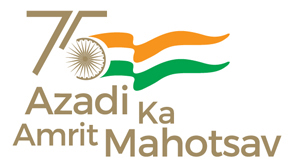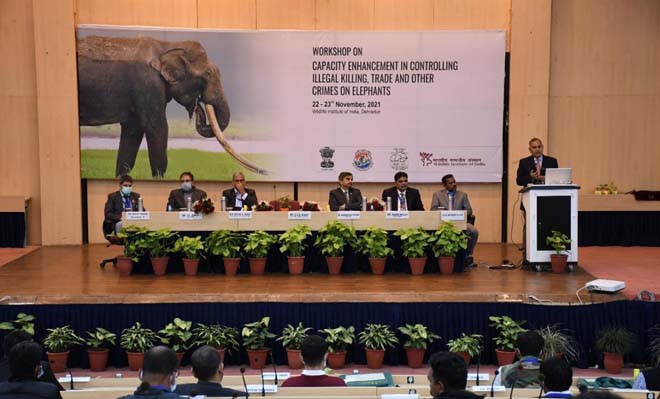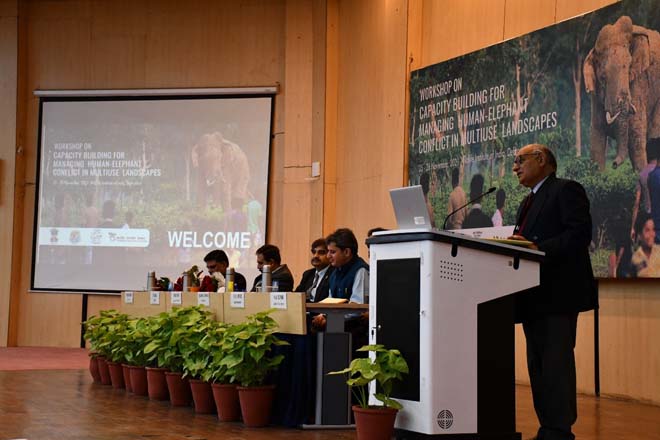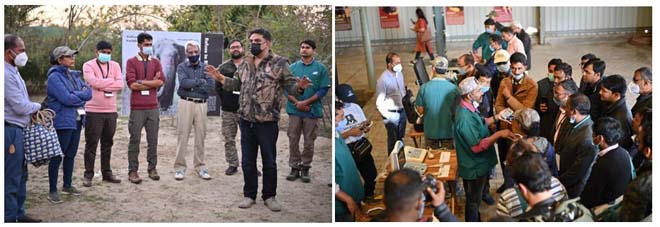Trainings and Workshops : 2021-2022
|
Capacity enhancement in controlling illegal killing, trade and other crimes on elephants on 22-23 November 2021 at WII, Dehradun The Project Elephant and Elephant Cell at Wildlife Institute of India along with Uttar Pradesh Forest Department and Wildlife S.O.S conducted a three-days residential workshop in Agra from 12th to 14th February 2022. This workshop was aimed to enable the veterinary professionals engaged in handling and managing captive elephants to understand routine husbandry, health and disease management, nutritional management, neonatal care and musth management. The training was formally inaugurated by Mrs. Mamta Sanjeev Dubey, PCCF and the Head of Forest Force, Uttar Pradesh, in the presence of Dr. Dhananjai Mohan, Director, WII who joined virtually and Shri. Ramesh Kumar Pandey. IGF (PE Div), MoEF&CC. This workshop was aimed to enable the field officers in improved law enforcement by sensitizing them to state-of-the-art vigilance and surveillance procedures, identification of habitual offenders and their prosecution and the rehabilitation of marginal poachers. It also aimed at providing an exposure to better investigation and prosecution techniques that include gathering prosecutable evidence through use of appropriate forensic tools using classroom inputs, case studies and field practical. The training was formally inaugurated by Dr D.V. S. Khati, Former PCCF & CWLW, Govt. of Uttarakhand in the presence of Dr Dhananjay Mohan, Director, WII, Sh. Ramesh Pandey, IGF (PE Div), MoEF&CC, Dr. Y.V. Jhala, Dean, Faculty of Wildlife Sciences including WII faculty. The workshop was coordinated by Dr. Parag Nigam, Scientist F, Dept. of Wildlife Health Management. Nodal Officer, Elephant Cell and Dr Bilal Habib, Scientist E, Dept. of Animal Ecology & Conservation Biology/ Associate Nodal Officer, Elephant Cell. The workshop was attended by eighteen field officers (ACF & DCF) working in different Elephant Reserves from 14 states including two each from Karnataka, Kerala, Uttarakhand and Odisha and one each from Andhra Pradesh, Bihar, Chhattisgarh, Jharkhand, Meghalaya, Madhya Pradesh, Nagaland, Tamil Nadu, Uttar Pradesh, Maharashtra and Uttarakhand. There were 12 resource persons including 6 internal resource persons that handled the technical sessions. The participants opined that the workshop was effective in enhancing their understanding and provided an opportunity for them to diversify their skill and gain knowledge proficiency in management of emergencies arising from illegal trade of wildlife products.
|
|
Capacity building for managing human–elephant conflict in multi-use landscapes on 25-26 November 2021 at WII, Dehradun This workshop was aimed to enable the field officers to understand the approaches widely used in HEC management, the ecological basis of HEC, case studies on measures that worked across different sites in India and other essential considerations. The training was formally inaugurated by Shri. Vinod Rishi, Former ADG (Wildlife), MoEF, Government of India in the presence of Dr Dhananjay Mohan, Director, WII, Dr. Y.V. Jhala, Dean, Faculty of Wildife Sciences and including WII faculty. The workshop was attended by twenty field officers (ACF & DCF) working in different Elephant Reserves from 14 states including two each from Karnataka, Kerala, Uttarakhand and Odisha and one each from Andhra Pradesh, Bihar, Chhattisgarh, Jharkhand, Meghalaya, Madhya Pradesh, Nagaland, Tamil Nadu, Uttar Pradesh, Maharashtra and Uttarakhand. There were 12 resource persons including 5 internal resource persons that handled the technical sessions. Both the days of the workshop were held at Wildlife Institute of India. The workshop included theoretical sessions on elephant ecology and behavior, overview of human–elephant conflict, drivers of human– elephant conflict, diversity of management strategies to address conflict and a panel discussion that flagged the main challenges and possible future directions. The theoretical sessions were made interactive and had references to case studies as applicable. Dr Bilal Habib, Scientist E, Dept. of Animal Ecology & Conservation Biology/ Associate Nodal Officer, Elephant Cell and Dr. Parag Nigam, Scientist F, Dept. of Wildlife Health Management and Nodal Officer, Elephant Cell coordinated the workshop. The participants opined that the workshop was effective in enhancing their understanding and provided an opportunity for them to diversify their skill in managing the human–elephant conflict situation.
|
|
Welfare and health management of captive elephants on 12th to 14th February 2022 at Agra The workshop was attended by twenty-five veterinary officers from 16 states including three from Uttar Pradesh, two each from Bihar, Karnataka, Madhya Pradesh, Odisha, Tamilnadu, Uttarakhand and West Bengal and one each from Andhra Pradesh, Chhattisgarh, Delhi, Haryana, Maharashtra, Meghalaya, Nagaland, and Tripura. Technical inputs were provided by 14 resource personnel that were all eminent experts in their own spheres of work. The workshop had 18 technical sessions focusing on a variety of themes that covered elephant biology, basic ecology, nutrition management, foot care, housing and welfare, infectious diseases, musth management, surgical interventions, neonatal care, necropsy procedures, gear and equipment for saddle, transportation, chemical immobilization, elephant training and operant conditioning, mahout welfare, genetic database management of captive elephants, and legal provisions concerning captive elephant management. In addition to theoretical sessions, there was a field visit to multi-specialty elephant hospital and camp managed by Wildlife S.O.S. thereby providing first-hand experience for the participants in understanding the nuances of captive elephant management. The workshop was coordinated by Dr. Parag Nigam, Scientist F, Dept. of Wildlife Health Management. Nodal Officer, Elephant Cell along with Shri. Kartick Satyanarayan, Co-founder and CEO - Wildlife SOS. The participants opined that the workshop was effective in enhancing their understanding and provided an opportunity for them to diversify their skill in managing welfare and health of captive elephants. They however opined to increase the duration of the workshop especially field sessions.
|
Last Updated: November 9, 2023












